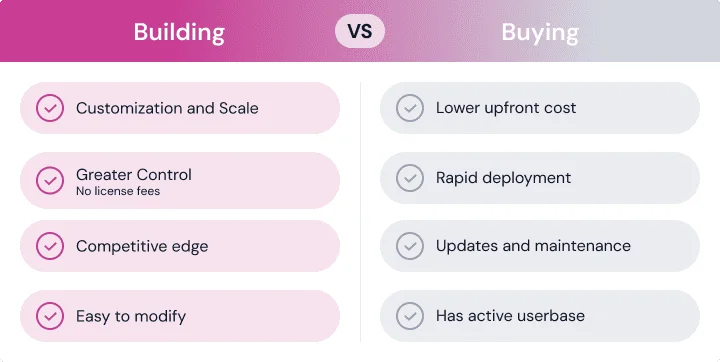Introduction
In today's business world, a software component is critical for any business looking to gain efficiency. Software systems that automate back office processes, from customer relationship management to billing to reporting, empower businesses to leverage technology and free up their finite labor resources for other, important work.
When it comes to software development solutions, it can be quite difficult to decide whether to choose the flexibility of building your own software or the speed of buying a tried-and-tested, third-party option off the shelf.
Many businesses today face that dilemma, and it's not just a question of cost. It's also important to consider a solution's efficiency, effectiveness and fit with your company's long-term goals.
Prior to making a decision about whether to build or buy, consider the following points:
- What are the issues you're trying to solve with software, and how unique are they?If, for example, you need a rather straightforward customer management system with some basic functionality, there will likely be many off-the-shelf solutions to choose from. But if you're looking for complex functionality or you're solving a problem specific to your company or industry, you may have trouble finding a workable solution on the market.
- Do you have the funds you need to see this project through to completion?Building custom software costs more upfront than purchasing pre-built software. Depending on the size and profitability of your business, this can be a deal-breaker.
- What are the time constraints for implementing a software solution?There are process models in software development that allow for generating working software modules quickly, but launching a fully-loaded custom software solution takes time, which the business may or may not have.The answers to these questions will help guide your decision, but it's important to consider the implications of each approach before pulling the trigger.
Build vs. buy: pros and cons
To help you decide, we've laid out some of the pros and cons of each option.
Pros of building
- Customization and scaleOne of the biggest pros of building your own custom software solution is that it will include all the functionality you need to operate in exactly the ways you need it to. The software you end up with will be tailored to your unique business model and challenges.Total control over the development also allows you to add any new features when needed so that your business can continue to run like a well-oiled machine. You can start with a prototype and grow the software as your revenues grow.Additionally, your employees will be able to give their feedback on what features are essential to streamline their workflows.
- Greater controlAs the sole owner of the solution, you will have full control over user options, security measures, and system updates. Plus, complete ownership gives you the option to market the product itself, offering your software as a service down the line.
- Competitive edgeWith a custom software solution, you can gain a competitive advantage by leveraging the most efficient, connected and scalable technology, helping your business get ahead of the game in your industry. Your software can differentiate your business from others in the crowded marketplace.
- Guaranteed integrationBuilding your own solution means you can ensure seamless integration with any existing software, tools, and processes already in use.
Cons of building
- Significant upfront costLike anything that is customized, a custom solution will cost more than an off-the-shelf product. However, off-the-shelf solutions may not always be the most economically feasible route in the long run.Over time, the use of pre-built software can create a loss of revenue due to the lack of scalability or critically essential functionality. Software that is specifically created and customized to your workflow can push production and profitability through the roof and lead to faster business growth.
- Time to buildIt takes time to identify your organization's workflow processes and develop the software that optimizes them. You have to be prepared to spend time gathering this information so that a custom solution will be appropriate and powerful for your business.
Pros of buying
- Lower upfront costIf cost is a major concern and you have limited resources to launch, pre-built software may be your best option since it is typically cheaper to buy and implement.
- Rapid deploymentReady-made programs should be good to go, as soon as you pay for them and load them onto your system. If an existing solution perfectly meets most of your needs, there may be little point investing time and money in developing a version of something that is already out there.
- Updates, new features and ongoing maintenanceThird-party providers will want to stay competitive. As well as keeping up with maintenance, a third-party solution will often be updated regularly with the latest features and functionality.
Cons of buying
- Less customizationWhile many third-party software solutions enable some customization, the solution won't be custom built for you. This could lead to issues down the line.
- Less controlThe vendor controls the solution's updates, volume capacity and functionalities. All the key decisions on the software's features and future are out of your hands.
- Compatibility and connectivity issuesPre-built software may not be compatible with other programs, devices or products that you are using today, or with solutions you may need to implement in the future.
- Long-term costAlthough ready-made software may be cheaper to buy initially, its costs may grow over time. Subscriptions and licenses tend to be time-limited, so you'll have to reinvest whenever they run out. What is more, if your company grows significantly, you will have to add more licenses for new employees.

Build vs buy: the verdict
There are a lot of factors to consider when deciding whether to buy off-the-shelf software or to go with custom software development to meet all your unique business needs.
If you decide to go with a third-party system, be sure to take the time to weigh the different vendors and solutions available. If you choose to build a custom software platform, recognize the time, effort, and costs it will incur, along with the long-term benefits.
If you're looking for a trusted partner to drive your next custom software development project forward, contact Syberry and tell us about your business goals.



